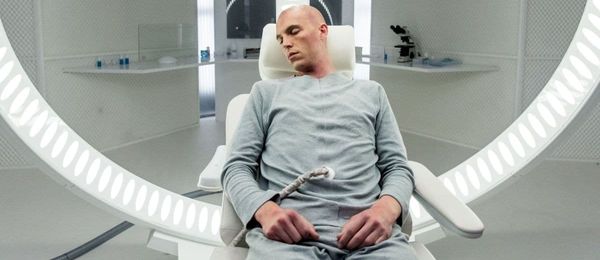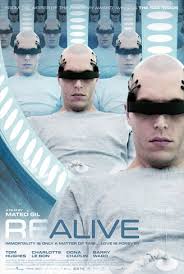Eye For Film >> Movies >> Realive (2016) Film Review
Realive
Reviewed by: Jennie Kermode

“Who wants to live forever?” This is a question we’ve heard before in film. Realive ditches the fantasy and the far future stuff to push it into a more immediate context grounded in contemporary science. This is the story of Marc (Tom Hughes), nicknamed Lazarus - the first man to be resurrected after having placed himself in cryogenic suspension.
Why does Marc freeze himself whilst still young and strong enough to make him a good candidate for revival? It’s cancer, of course – cinema’s go-to serious illness, represented here with the usual overexposed photography, ponderous self-analysis and flashbacks to what seems to have been an almost completely stress-free childhood – perhaps the very factor that makes Marc crave more life and makes him so unsuited to it. Because resurrection isn’t what Marc expected. He doesn’t find himself waking up in a utopian future where everything is possible. His cancer is gone but it takes him time to learn to walk again and he’s going to need medical support for the rest of his life – pending further technological advances, anyway. Rather than being at liberty, he’s carefully monitored, cared for, studied – and he can’t stand it.

To say that Realive is an ablist film would be a colossal understatement. Whilst individuals will always have variable coping skills and no one person could speak for everybody, Marc’s extensive voiceovers easily give the impression that he’s doing so and reinforce societal prejudices about the unimaginable horror of having a less than perfect body. This points up interesting parallels that the film never addresses directly. If being revived in this condition is intolerable, why do people choose to go on living out their initial span with far more debilitating disabilities than his? If there’s something innately unacceptable about being resurrected in such a condition, why don’t we encourage more people to choose an early death the first time around? Vague mutterings about a soul do little to resolve this. Good science fiction should always produce more questions than answers, but this is complex territory, clumsily handled.
The film is stronger when it comes to futurism. The whiteness of everything looks outdated, Gernsbackian, even in a medical institute – and contrary to trends in that sector – but every portrait of the future needs to make choices. Shifts in sexual mores are handled with a refreshing lack of sensationalism and there’s a bold, if slightly unrealistic, attempt to anticipate developments in social media, which in turn provides the film with an additional narrative tool. Clothing choices suggest we’re in the same universe as Minority Report, but the film’s main point is that we shouldn’t expect huge changes in every aspect of life. This gives Marc new ideas to adjust to without him being so overwhelmed that there’s no room for any other story.
The film’s main problem, however, is that it doesn’t have much other story. Marc is clearly depressed but simply spirals downwards with no help offered, and it’s difficult to believe that nobody in an institute which is paying constant attention to other aspects of his health would notice this – nor that nobody would predict it when he’s offered little environmental stimulus. The result is not exactly stimulating for the viewer and makes the classic mistake of confusing misery with depth. It’s a shame because the filmmakers are not without a sense of humour, which shows through in details like the name of Marc’s physician (Victor West, a reference to Frankenstein and Reanimator).
Realive is beautifully produced, with a capable cast and great technical work all round. This polish will effectively gloss over its weaknesses as far as many viewers are concerned. Though it occasionally resorts to eloquent nonsense, most of its science is feasible enough, and it’s clear that an effort has been made to understand the practical issues involved in resurrection. Observations about the advancement of science and the cost of progress are well made, though the implication that this might make progress unconscionable is unfortunate in the absence of any attempt to posit an ethical alternative. This tendency to Luddism and one-sidedness is present in a number of the ethical conjectures it makes, and is exacerbated by an approach to ethics among its clinician characters, which wouldn’t meet contemporary standards, giving the impression that there’s something innately untrustworthy about those working in this field. To return to Shelley’s work, we are one again dealing with accusations of playing God in a context where nobody has defined why that’s a problem.
As a human story, Realive is well played, albeit mawkish. As a piece of futurism, it is at least alert to the big picture. As a philosophical treatise, it falls well short of the mark. If you’re looking for horror, what you find will depend very much on what you take in there with you.
Reviewed on: 29 Aug 2016















